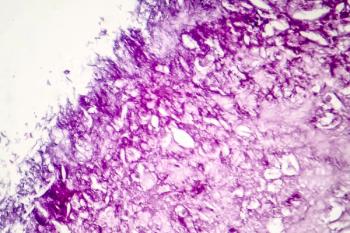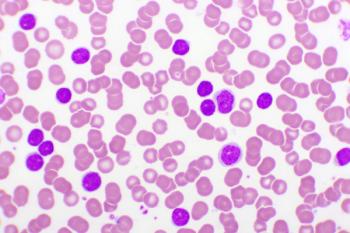
The latest episode of Oncology Peer Review On-The-Go explores an article from the September issue of the journal ONCOLOGY regarding the psychological states of patients enrolling in phase 1 clinical trials.

Your AI-Trained Oncology Knowledge Connection!


The latest episode of Oncology Peer Review On-The-Go explores an article from the September issue of the journal ONCOLOGY regarding the psychological states of patients enrolling in phase 1 clinical trials.

Natera announced the DARE trial examining Palbociclib to treat patients with advanced breast cancer will use its Signatera molecular residual disease test.

A study published in The BMJ concluded that a single dose of targeted radiotherapy was just as effective as conventional radiotherapy for women with early breast cancer.

A study published in the Journal of Clinical Oncology found that rucaparib can successfully treat patients with metastatic castration-resistant prostate cancer who have mutated BRCA/BRCA2 genes.

A study published in JAMA Dermatology determined that topical immunosuppressant medications used to treat adult patients with atopic dermatitis do not increase the risk of common forms of cancer despite warning labels on the packaging.

A study found that the historically higher lung cancer incidence rates for young Blacks compared to Whites in the United States disappeared for men and reversed for women.

A study found that delaying radiation therapy while remaining on hormone therapy for patients with unfavorable intermediate-risk or high-risk localized prostate cancer to avoid potential exposure to COVID-19 did not negatively impact overall survival.

Mesoblast Limited announced that the FDA issued a complete response letter regarding its biologics license application for remestemcel-L to treat pediatric patients with SR-aGVHD after the ODAC voted 9:1 in favor of the available efficacy and data.

A study found that radiation therapy to treat childhood abdominal and pelvic cancers potentially caused body composition abnormalities and worse cardiometabolic health for adult survivors compared to the general public.

CancerNetwork examines a review article in the September issue of the journal ONCOLOGY discussing precision medicine and molecular profiling for patients with metastatic colorectal cancer.

xCures recently announced that the FDA granted its IND immediate Expanded Access Program for the ERK inhibitor ulixertinib to treat patients with MAPK pathway aberrant cancer.

Data for the phase 3 COMBI-i trial showed that spartalizumab combined with dabrafenib and trametinib did not meet its primary end xpoint of investigator-assessed progression-free survival.

The latest episode of Oncology Peer Review On-The-Go sits down with Michael D. Randell, MD, FACOG, to discuss the latest updates to cervical cancer screening guidelines by the American Cancer Society.

Partner Therapeutics, Inc. announced that its EA6141 study evaluating sargramostim in combination with ipilumimab and nivolumab to treat melanoma was approved to begin enrollment.

Researchers found that long-term treatment-free remission was not impaired by low-dose TKI regimens for patients with chronic myeloid leukemia.

The medical oncologist spoke about the need to make next-generation sequencing available to all patients with gastrointestinal cancer.

BeyondSpring announced recently that the FDA granted its lead asset, plinabulin, breakthrough therapy designation for its chemotherapy-induced neutropenia indication for patients with cancer.

A study published in Cancer found prognostic factors in patients who experienced disease progression while receiving anti-PD-1 therapy to treat advanced melanoma.

A systemic review of oncology clinical trials found a large difference between unadjusted and bias-adjusted hazard ratios when the number of events at interim analysis was small.

The newest episode of “Oncology Peer Review On-The-Go” features 2 competing opinions on next-generation sequencing for the treatment of gastrointestinal cancers.

A restrospective study published in JAMA Dermatology found that integrating dermatologic care into oncology practices might be associated with an increased adherence to evidence-based prophylaxis for EGFRi-associated rash.

A study published in Cancer found that the introduction of generic aromatase inhibitors reduced the decrease trend of adherence to hormonal therapy for patients with breast cancer.

The FDA recently announced updates to the adverse event-related data pertaining to breast implant illness and breast implant-associated anaplastic large cell lymphoma.

The latest episode of “Oncology Peer Review On-The-Go” examines how the coronavirus disease 2019 pandemic is impacting routine cancer screenings, and the strategies to get those appointments rescheduled.

A study published in JAMA Network Open found that women who were diagnosed with interval breast cancers within 1 year of a negative mammogram result experienced worse survival rates than patients with breast cancer detected by screenings.

A phase 2 study found that data from a 3-year follow up showed statistically significant improvements in overall survival for patients with high-risk locally advanced squamous cell carcinoma of the head and neck treated with an IAP antagonists with chemo-radiation therapy.

Bristol Myers Squibb announced that their phase 3 CheckMate-649 trial demonstrated superior overall survival and profession-free survival using nivolumab plus chemotherapy to treat patients with gastric and esophageal cancers.

Bristol Myers Squibb’s CheckMate-577 trial, which evaluated nivolumab to treat patients with resected esophageal or gastroesophageal junction cancer, met the primary end point of disease-free survival.

Data from the phase 3 CheckMate-743 trial showed a statistically significant overall survival benefit for patients with previously untreated, unresectable malignant pleural mesothelioma when treated with nivolumab plus ipilimumab.

Data released from a phase 2b clinical trial showed statistically significant long-term survival for patients with stage III or IV melanoma at high-risk of recurrence.